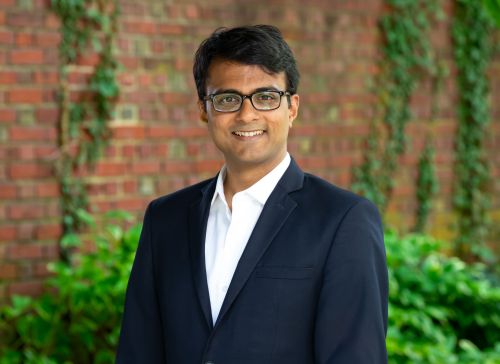
By Julia Schwarz
August 23, 2023
Aditya Sood has joined the Department of Mechanical and Aerospace Engineering and the Princeton Materials Institute as an assistant professor, bringing expertise in the dynamic properties of materials.
In many everyday engineering applications, Sood said, materials are not static. “You think about your phones, with transistors switching. You think about your hard drive, which is storing and erasing information. You think about solar cells, where you shine light and get a current out of it. The materials in these applications are constantly evolving.”
Fundamental processes in materials can take place extremely quickly. For example, atoms that vibrate trillions of times per second govern the generation and transmission of heat. These ultrafast phenomena are a primary area of interest for Sood and his lab group. In one project, his lab plans to make movies of heat moving through materials and navigating their microstructures, capturing what happens at the nanoscale during thermal transport. Another project plans to take snapshots of the pathways that atoms take when materials are electrically shocked, like in a memory device that is switching between two electronic states, or in a battery electrode that has ions moving into and out of it.
"Beyond visualizing dynamics, we want to understand if we can rationally engineer materials and create any sort of structure that we want, to get the type of thermal, electronic, and ionic conduction properties that we want," he said. The applications of this work are numerous. On the thermal side, his lab is exploring applications in microelectronics and semiconductor chips, which consume ever-increasing amounts of energy and produce a lot of heat.
"It’s a really exciting physics problem,” he said, “with immense real-world implications.”
Sood’s research extends across several disciplines, including mechanical engineering, applied physics, materials science and electrical engineering. His interdisciplinary interests are one reason he decided to join Princeton Engineering. Because the school is relatively small, he said, you get many opportunities to interact with colleagues in other departments. “To get to my office in MAE I often walk through electrical and computer engineering or chemical and biological engineering — that isn’t something you can do everywhere,” he said.
Sood, who is originally from Bangalore, India, became interested in materials science initially through conversations with his father, who is an experimental physicist. He stumbled upon his interest in heat transfer by attending a colloquium while a graduate student in the department of materials science at Stanford. For his postdoc, he changed directions to build new kinds of techniques to take ultrafast snapshots of atoms inside electronic devices at the SLAC National Accelerator Lab.
Fundamental curiosity, he said, and a drive to always be exploring and discovering something new, has turned out to be instrumental in his work as a researcher and engineer. Some of his best ideas and collaborations have come from purely chance interactions, something he hopes will continue at Princeton.
Before joining Princeton in January 2023, Sood was a postdoctoral fellow and research scientist at the Stanford Institute for Materials and Energy Sciences. He completed his doctoral work in materials science at Stanford, and a bachelor’s degree from the Indian Institute of Technology in Kanpur, India.